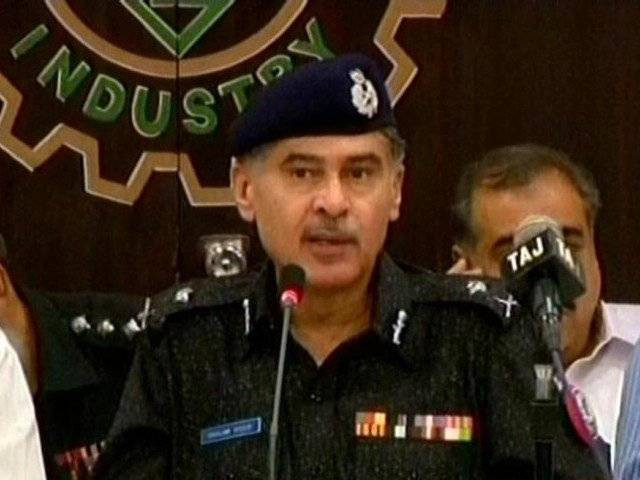Facing the music: SC to pass orders against IG if govt fails to take action
Apex court hears cases against Sindh Police’s corruption

Express News screengrab of IG Sindh Ghulam Haider Jamali.
The Supreme Court (SC) directed on Wednesday the provincial chief secretary to find out what action the government will take against officers found guilty of corruption, which includes the provincial police chief, otherwise the apex court will pass such orders.
The SC Karachi registry bench gave Sindh chief secretary Siddique Memon time until today (Thursday) when the case will be taken up again. The SC larger bench, headed by Justice Amir Hani Muslim and comprising justices Sheikh Azmat Saeed and Khilji Arif Hussain, was hearing cases on withholding of funds meant for police investigations and corruption in appointments in Sindh Reserve Police.
When the hearing started on Wednesday morning, Sindh IG Ghulam Hyder Jamali asked the bench to hear his two criminal review applications. One of these was against the formation of a three-member committee, comprising three senior police officers, to investigate the corruption charges.
On December 23, 2015, the court had constituted the inquiry committee for which his consent was not sought, Jamali argued with a plea to review the order and replace the three officers - AIGs Sanaullah Abbasi, AD Khawaja and Naeem Ahmed Sheikh - as he did not trust them. The judges asked the chief secretary whether or not the review application was filed on behalf of the Sindh government but he replied in the negative.
Keeping aside the pleas, the bench observed that the officer cannot seek a review himself in the capacity of police IG. The judges clarified that the inquiry was not ordered to personally target the IG. Rather, it was meant to take to task all the officers whosoever was involved.
Justice Amir Hani Muslim observed that the court had suggested referring the matter to the National Accountability Bureau to investigate the matter but, considering request of the advocate-general and with consent of the IG himself, the committee was formed.
IG’s conduct
The bench members took strong exception to the notices issued by IG Jamali to the officers who were part of the inquiry committee. These officers claimed Jamali’s actions were meant to target them for initiating the inquiry.
Driving Licence Branch DIG Aftab Pathan said the IG issued him a notice seeking an explanation into revenue collections allegedly to avenge his investigations into corruption in police appointments. Even AIG Sanaullah Abbasi said the IG issued him a show-cause notice asking why he did not order action against policemen found involved in kidnapping citizens for ransom. These officers feared the IG would write negative comments on the Annual Confidential Reports to victimise them.
Justice Muslim expressed extreme displeasure over Jamali’s conduct, ordering him to take back notices issued to the police officers in an attempt to victimise them. Otherwise, the court will consider IG’s actions as an attempt to frustrate the court’s orders, he warned.
NAB report
Meanwhile, the NAB prosecutor general Waqas Deedar Dar submitted a ‘sealed’ report on the findings of the inquiry into the misappropriation of funds meant for different wings of the police department. Without discussing the findings in open court, the judges asked the chief secretary about the provincial government’s views in the light of NAB’s findings. The secretary said he had no instructions from the competent authority.
Allowing time, the bench directed him to seek instructions from the competent authority as to what action will be taken against those officers found guilty in inquiries conducted by the three-member committee formed by the court as well as by NAB. The hearing continues today.
Published in The Express Tribune, March 10th, 2016.



















COMMENTS
Comments are moderated and generally will be posted if they are on-topic and not abusive.
For more information, please see our Comments FAQ